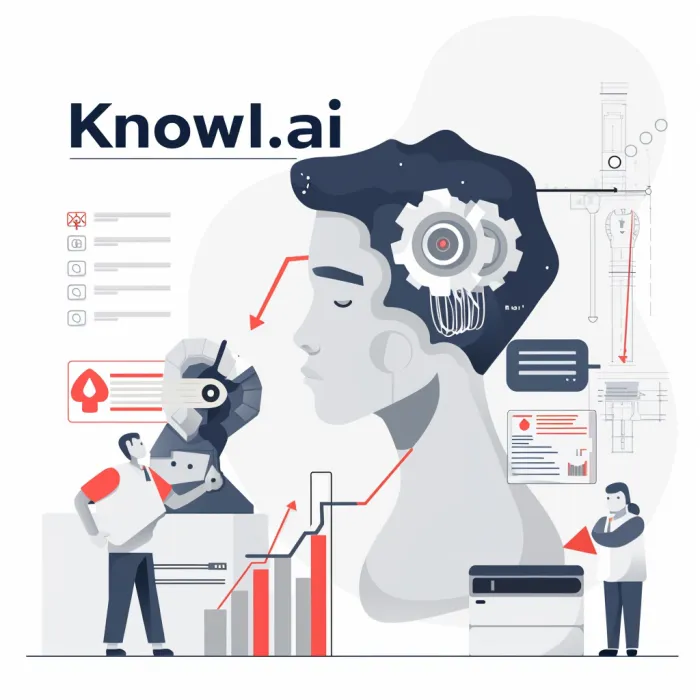Welcome to the bustling world of Knowl.ai, where API documentation is magically simplified, and the quest for knowledge is an adventure. Today, we're unraveling the mystique surrounding a pivotal role in the tech realm: the API Product Manager. This guide isn't just about definitions; it's a map to understanding the treasures that API Product Managers bring to the digital seas, ensuring smooth sailing for developers, product managers, and curious minds alike.
What is the Role of an API Product Manager?
In the ever-evolving digital landscape of API strategy, a good API Product Manager needs to be the captain of the ship, navigating through the choppy waters of API development and management and API security. But what exactly does this role entail, and why is it so crucial for the success of APIs as products? Let's dive in to api strategy and the role of product manager.
Understanding the Role of an API Product Manager
The role of an API Product Manager is a unique blend of technical know-how and visionary product strategy. They are the architects behind the APIs, crafting not just how they work, but also how they fit into the broader ecosystem and business model. This role requires a deep understanding of the target audience's needs, the competitive landscape, and the technical possibilities to ensure that the API serves as a valuable and viable product.
Key takeaway: API Product Managers bridge the gap between technical possibilities and business opportunities, ensuring that APIs meet both user needs and strategic business goals.
Responsibilities of an API Product Manager
From ideation to retirement, the responsibilities of an API Product Manager span the entire lifecycle of an API. They are tasked with defining the product vision, setting the roadmap, collaborating with engineering teams for development, and ensuring seamless onboarding for users. Moreover, they play a crucial role in stakeholder management, balancing the needs of developers, partners, and the business to steer the API product towards success.
Key takeaway: An API Product Manager oversees the API from concept to grave, ensuring it aligns with business strategies and user needs throughout its lifecycle.

Skills Required for a Successful API Product Manager
To wear the hat of an API Product Manager, one must possess a unique set of skills. Technical expertise in API development and security is just the beginning. A successful API Product Manager also needs a keen sense for product strategy, the ability to manage stakeholder relationships, and the foresight to anticipate market and technology trends. Communication skills are equally vital, as explaining the value and vision of the API is key to fostering adoption and success.
Key takeaway: Technical know-how, strategic thinking, stakeholder management, and communication prowess are essential skills for a successful API Product Manager.
How to Develop and Manage APIs effectively?
Developing and managing APIs is not just about coding; it's about ensuring that these digital products thrive in a competitive ecosystem. Let's explore the strategies, best practices, and tools that can elevate your API from a simple function to a market-leading product.
Strategies for Developing API Products
Developing an API product requires a strategic approach that goes beyond technical execution. Understanding the use cases, defining clear value propositions, and ensuring the API design is intuitive and user-friendly are foundational steps. Additionally, embedding flexibility for future evolution without breaking existing integrations ensures your API remains relevant and valuable over time.
Key takeaway: A strategic approach to API development focuses on user needs, clear value propositions, and future scalability to ensure long-term success.
Best Practices for API Lifecycle Management
API lifecycle management is the art of keeping your API healthy and thriving. This involves regular audits for performance and security, iterative updates based on user feedback, and clear communication with your API community about changes and new features. Keeping the API documentation up-to-date, especially with tools like Knowl, is also crucial for maintaining a seamless developer experience.
Key takeaway: Effective API lifecycle management requires continuous monitoring, updating, and communication to ensure the API remains secure, performant, and aligned with user needs.
Tools for API Management
The right tools can make or break your API management strategy. From API gateways that manage traffic and security to analytics platforms that provide insights into usage patterns, choosing the right set of tools is critical. Additionally, developer portals and documentation generators like Knowl play a crucial role in fostering a vibrant API user community by simplifying onboarding and ongoing engagement.
Key takeaway: Leveraging the right API management tools is essential for securing, analyzing, and enhancing the developer and user experience of your API product.
Why is API Product Management Important?
In today's digital tapestry, APIs are the threads that weave together services, applications, and systems, creating a seamless user experience. But who ensures these threads are strong, vibrant, and perfectly intertwined? Enter the API Product Manager, the visionary and architect behind successful APIs.
The Significance of API in Today’s Digital Landscape
APIs are the unsung heroes of the digital age, enabling the seamless interactions between different software applications that we often take for granted. From social media integration to cloud storage access, APIs fuel the digital ecosystem, making them indispensable for modern businesses. Understanding APIs and their management is crucial not just for tech aficionados but for anyone keen on navigating the digital world with finesse.
Key takeaway: APIs power the digital interactions that define our everyday experiences, underscoring the importance of adept management.
Benefits of Having a Well-Managed API
A well-managed API is like a well-oiled machine, capable of driving innovation, enhancing user experience, and opening new revenue channels. It ensures reliability, security, and scalability, which are critical for maintaining trust and satisfaction among users and developers alike. Moreover, it can transform a company's service offerings, propelling it from a mere participant to a leader in the digital arena.
Key takeaway: Effective API management catalyzes business growth, innovation, and customer satisfaction.

Creating a Successful API Product Strategy
Crafting a successful API product strategy involves understanding your audience, defining clear goals, and aligning your API's capabilities with market needs. It's about seeing your API not just as a tool, but as a product that solves real problems. This strategic vision requires a blend of technical insight and business acumen, ensuring that your API remains relevant, competitive, and profitable.
Key takeaway: A visionary API product strategy is foundational to developing APIs that deliver real value and stand the test of time.
Ensuring Success as an API Product Manager
Navigating the role of an API Product Manager is akin to captaining a ship through uncharted waters. It requires a keen eye for detail, a solid understanding of the technical and business landscape, and the ability to steer your team toward a common vision.
Navigating Stakeholder Relationships as an API Product Manager
Managing stakeholder relationships is crucial in the realm of API product management. It's about harmonizing the visions of developers, business executives, and end-users, ensuring that the API meets diverse needs while aligning with business goals. This balancing act is key to securing buy-in and fostering a collaborative environment that drives API success.
Key takeaway: Effective stakeholder management is essential for aligning API development with both user needs and business objectives.
Key Elements of Seamless API Onboarding for Users
Seamless API onboarding is your first impression, a crucial moment to engage and retain your developer audience. It involves clear, comprehensive documentation (a forte of Knowl.ai), easy-to-use tools, and supportive community engagement. Ensuring developers can quickly grasp and implement your API means faster adoption and a stronger developer community.
Key takeaway: Smooth onboarding is critical for encouraging API adoption and fostering a positive developer experience.
Adapting to New Trends and Features in API Development
In the fast-paced world of technology, staying abreast of new trends and features in API development is non-negotiable. Whether it's REST APIs, GraphQL, or new security protocols, a successful API Product Manager must be a lifelong learner, constantly refining and evolving the API to meet emerging demands and expectations.
Key takeaway: Continuous learning and adaptation are vital for maintaining the relevance and competitiveness of your API.
Fun Fact
Did you know the concept of APIs (Application Programming Interfaces) has been around since the 1940s? They've evolved from basic software libraries into the web APIs we know today, powering the internet and enabling apps to communicate seamlessly.
FAQs for API Product Management
1. What does an API Product Manager do?
An API Product Manager oversees the entire lifecycle of an API, from ideation and development to maintenance and retirement, ensuring it meets both user needs and business goals.
2. Why is API management considered important?
Effective API management ensures APIs are scalable, secure, and functional, fostering innovation and enabling businesses to leverage new opportunities in the digital ecosystem.
3. How does an API Product Manager prioritize new features?
They evaluate user feedback, market trends, and business objectives to prioritize features that align with the strategic vision and deliver the most value to users.
4. Can API Product Managers influence the technical architecture of an API?
Yes, they play a crucial role in shaping the API's technical architecture by working closely with the engineering team to ensure the API's design supports its intended use cases and business strategy.
About Knowl.io
Introducing Knowl.io, the revolutionary AI-driven platform designed to transform how API documentation is created and maintained. Say goodbye to the painstaking process of manually updating specifications with each code change—Knowl.io does the heavy lifting for you. With seamless integration into your development workflow, Knowl.io ensures your API documentation is perpetually accurate, reflecting the latest updates in your codebase without the need for manual annotations or explanations.
At the heart of Knowl.io is cutting-edge AI technology that meticulously identifies endpoints, parameters, and behaviors, crafting detailed and up-to-date API documentation with comprehensive explanations. Trust Knowl.io to elevate your documentation process, making it more efficient and reliable than ever. Ensure your developers and stakeholders always have access to the most current and coherent API documentation with Knowl.io, where innovation meets simplicity.


